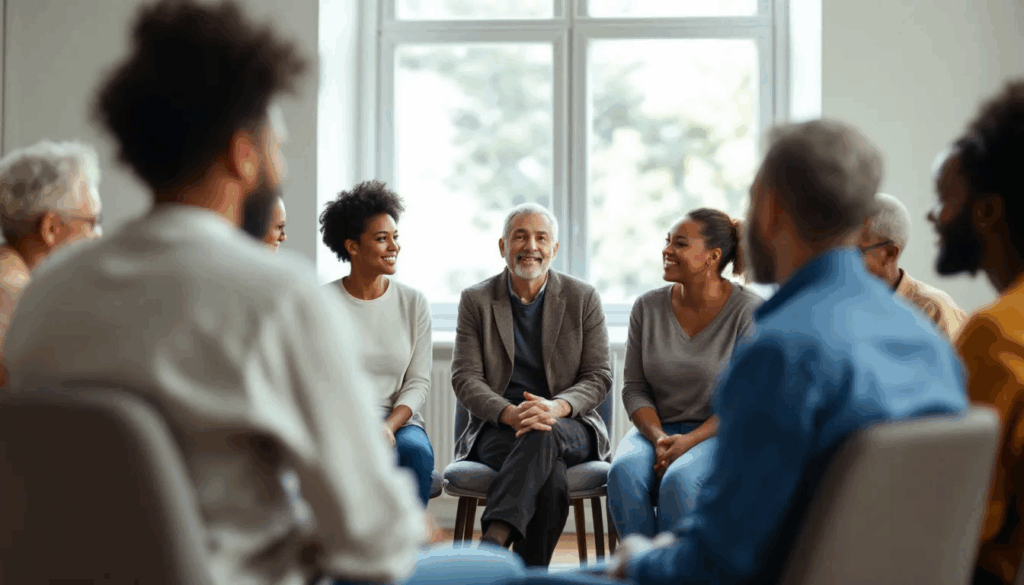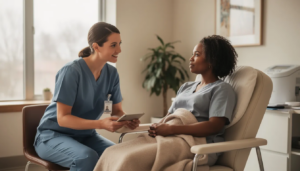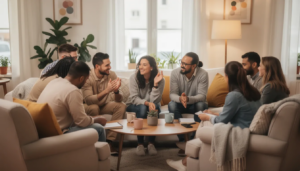
Support Groups for Families of Drug Addicts: Complete Guide 2025
-
 By:
Alex Herrera
By:
Alex Herrera
-
 Editor:
Phyllis Rodriguez, PMHNP-BC
Editor:
Phyllis Rodriguez, PMHNP-BC
-
 Clinical Reviewer:
Dr. Ash Bhatt, MD, MRO
Clinical Reviewer:
Dr. Ash Bhatt, MD, MRO
Key Takeaways
- Support groups for families of drug addicts provide community, education, and practical tools that ease isolation and improve coping.
- You can choose from 12-step, secular, and faith-based options—and it’s okay to try several before deciding.
- Pairing peer support with professional treatment at Legacy Healing Center can strengthen outcomes for the whole family.
- You don’t have to do this alone. Call Legacy Healing Center to learn about family therapy, educational workshops, alumni resources, and help connecting with a support group that fits your needs.
Support Groups for Families Affected by Drug Addiction
When someone you love struggles with drug addiction, the entire family feels the impact. Feelings of guilt, anger, fear, and helplessness often take root, leaving family members unsure how to help while also protecting their own well-being. At Legacy Healing Center, we recognize that addiction is a family disease—and that recovery is strongest when families heal together. Whether you’re navigating a crisis or rebuilding trust, learning how to respond to a loved one’s drug addiction can give your family structure, hope, and direction.
One of the most effective ways families can begin their own healing journey is by connecting with support groups for families of drug addicts. These groups provide comfort, education, and community for those who might otherwise feel alone in their struggle. These groups are especially helpful for families struggling to set limits, communicate clearly, and find consistent sources of encouragement.
What Are Support Groups for Families of Drug Addicts?
Support groups are safe, structured environments where family members come together to share experiences, gain education, and build coping strategies. Families learn not only how to support their loved one in recovery, but also how to protect their own mental, emotional, and spiritual health.
Research consistently finds that family participation in support groups improves coping skills and reduces isolation. By learning healthy boundaries and moving away from enabling behaviors, families are empowered to find hope and strength.
Addiction affects the entire family system—not just the person using substances. Loved ones may experience guilt, shame, anger, fear, or helplessness and can develop codependent or enabling patterns. Support groups provide practical education about addiction as a disease and teach families how to care for themselves while supporting their loved one. Many families first arrive seeking clarity on the difference between drug addiction and substance abuse, and support groups help explain how both can impact family dynamics over time.
At Legacy Healing Center, we encourage families to use support groups alongside professional treatment—because long-term healing often requires both. By blending peer-led meetings with clinical care, families receive comprehensive support that addresses emotional needs, education, and actionable next steps.
Support groups operate under several models, each with distinct approaches and philosophies:
- 12-step programs: Spiritual/values-based peer support centered on acceptance and personal growth
- Secular programs: Science-based, using cognitive-behavioral and skills-focused tools
- Faith-based programs: Integrate religious beliefs and spiritual practices into recovery
Types of Support Groups for Families of Drug Addicts
The landscape of family addiction support groups is diverse. Most family programs welcome anyone affected by substance use, including alcohol abuse and polysubstance concerns. Understanding your options helps you choose the setting that fits your needs and beliefs.
12-Step–Based Support Groups
- Nar-Anon Family Groups serve families and friends of people with drug addiction. Meetings (typically 60–90 minutes) include readings, sharing, and discussion of the 12 steps. The focus is on your own growth rather than trying to control a loved one’s behavior.
- Al-Anon Family Groups began for families affected by alcoholism and now welcome anyone impacted by a loved one’s substance use. While Alcoholics Anonymous focuses on the person with a substance use disorder, parallel family groups help loved ones heal in tandem. The program emphasizes “detachment with love,” helping members maintain healthy emotional boundaries. Many Al-Anon newcomers arrive because someone else’s drinking—or drug use—has begun to affect the entire household.
- Families Anonymous (FA) welcomes families dealing with any addiction or related behavioral concerns, with a strong emphasis on anonymity and confidentiality. Because Families Anonymous prioritizes privacy and safety, many first-timers feel at ease asking questions about boundaries and next steps. Many locations also list related behavioral programs for codependency, boundaries, and parenting skills to complement weekly meetings.
- Co-Anon offers support for families specifically affected by cocaine use while following 12-step principles.
Spiritual components vary by group. While many reference a “higher power,” members of all (or no) faiths are welcome.
Science-Based & Secular Options
- SMART Recovery Family & Friends teaches evidence-based tools for managing stress, communicating effectively, and setting boundaries—emphasizing personal choice and self-management. This science based program equips families to identify triggers, challenge unhelpful thoughts, and reinforce healthy boundaries.
- Rational Recovery family resources use cognitive-behavioral concepts to help families challenge unhelpful thinking patterns.
- LifeRing Family Support provides a secular, interactive format that encourages cross-talk and collaborative problem-solving.
Specialized Support
- Parents of Addicted Loved Ones (PAL): Christian-based guidance specifically for parents.
- GRASP (Grief Recovery After a Substance Passing): Peer support for families grieving a loss related to substance use. Facilitators often integrate grief recovery tools to address complex emotions like anger, guilt, and unanswered questions. Families processing a substance passing often need spaces that acknowledge stigma and complicated grief without judgment.
- Adult Children of Alcoholics/Dysfunctional Families (ACA): Support for adults who grew up with addiction or dysfunction at home. ACA provides language and tools for adults from dysfunctional homes to rebuild trust, intimacy, and self-esteem.
- NAMI Family Support Groups: Help for families navigating co-occurring mental health conditions alongside substance use.
- Learn to Cope: Peer-led education and support—particularly for parents impacted by opioid use.
Benefits of Joining Family Support Groups
Participating in support groups for families of drug addicts can offer:
- Emotional relief: Reduced isolation, shame, and anxiety; feeling understood by peers
- Practical skills: Boundary-setting, crisis planning, and effective communication
- Education: Addiction science, treatment options, and relapse awareness
- Community: Consistent encouragement and accountability
- Personal growth: Resilience, self-care, and healthier family dynamics
These skills translate into calmer conversations, clearer expectations, and healthier routines around your loved one’s addiction. As families practice coping skills week after week, they often notice improved communication, calmer decision-making, and less crisis-driven reacting. Families who combine peer support with professional services at Legacy Healing Center often report stronger recovery outcomes and healthier relationships.
How to Choose the Right Support Group
Ask yourself:
- Do I prefer a spiritual or secular approach?
- Am I more comfortable listening first or sharing right away?
- Do I want a small, intimate group or a larger community?
- What meeting times realistically fit my schedule?
- Would I benefit from a general group or a specialized option (e.g., grief, parents, co-occurring mental health)?
It’s okay to try several groups before deciding. Most welcome newcomers to “listen only” for as long as needed.
Online vs. In-Person Support Groups
Online meetings offer accessibility, privacy at home, and flexible scheduling across time zones. Virtual meetings make it easier for caregivers and parents to participate consistently without arranging transportation or childcare. This flexibility is crucial for people living far from urban centers or those with limited mobility.
In-person meetings provide richer nonverbal connection, local community ties, and a focused, distraction-free space. For many, showing up in person also reinforces commitment and reduces the temptation to skip when life gets hectic.
- Many families use a hybrid approach—attending in person when possible and joining online during busy or stressful periods.
Finding Support Groups in Your Area
Start with national organizations that maintain up-to-date meeting finders (Nar-Anon, Al-Anon/Alateen, SMART Recovery Family & Friends, LifeRing, PAL, GRASP). Healthcare providers, luxury treatment centers, community mental health agencies, faith communities, local health departments, and 2-1-1 can also guide you to options nearby. Apps and directories (like Meeting Guide and Psychology Today) can help you search by location or topic.
Don’t limit your search to groups labeled strictly for “drug addiction.” Many family groups welcome anyone impacted by alcohol, prescription medications, multiple substances, or any substance use disorder.
How Legacy Healing Center Can Help
- Personalized guidance: We help families identify and connect with the right local or virtual groups near our facilities and in your community.
- In-house support: Legacy’s family therapy, educational workshops, and alumni network add layers of support beyond peer groups.
- Easy next step: Call Legacy Healing Center to speak with a team member who can match you with resources that fit your needs and schedule.
What to Expect at Your First Meeting
Most family support meetings last 60–90 minutes and follow a familiar structure: a brief opening, optional introductions (first names only), and either a speaker, discussion, literature study, or step-focused format. Participation is always voluntary.
Etiquette & Safety
- Arrive a few minutes early, if possible, and introduce yourself to the leader/secretary.
- Listen respectfully; no cross-talk unless the group allows it.
- Confidentiality is core: what’s shared in the room stays in the room.
- Newcomers often receive welcome materials and lists of other meetings.
Feeling emotional or overwhelmed after your first meeting is normal—many people do. Give yourself time and try a few meetings before you decide. Group leaders or seasoned members are usually available before and after the meeting, providing support and answering newcomer questions.
- Learn more about What to Expect in Your First 12 Step Meeting
Overcoming Common Barriers
- Stigma & shame: Groups exist because millions of families are affected—judgment is not part of the mission.
- Time constraints: Consider online, phone, lunchtime, evening, or weekend options.
- Transportation/childcare: Try online meetings or look for groups that provide childcare.
- Cost: Most are free or donation-based.
- Language/culture: Search for language-specific or culturally responsive groups; online options broaden availability.
- Family resistance: Your healing doesn’t require anyone’s permission. Caring for yourself benefits everyone. If you’re supporting an addicted loved one, starting with a single meeting—online or local—can lower anxiety about taking that first step.
Practical tips: start with one online meeting, bring a trusted friend, and set small goals (e.g., attend twice this month).
Long-Term Participation & Recovery
Continued involvement deepens relationships, expands skills, and builds resilience for future challenges. Many programs also offer sponsorship/mentorship and service roles (secretary, treasurer, literature, newcomer contact), which can strengthen your recovery network.
If you later reduce attendance, consider tapering gradually and keeping contact info for trusted members so support remains within reach.
Professional Treatment + Peer Support
Support groups are powerful, and they’re even more effective when integrated with professional care. Legacy Healing Center provides:
- Family therapy with experienced clinicians
- Education programs on boundaries, communication, and relapse awareness
- Alumni & family networks for ongoing community and accountability
Professional help is especially important when there are significant mental health concerns, safety risks, complex family dynamics, or legal/financial stressors. Check your insurance for family therapy benefits or employee assistance program options.
Keep crisis resources handy (local crisis lines, suicide prevention hotlines, domestic violence support, emergency behavioral health services), and your loved one’s care team contacts.
Call Now: (888) 534-2295 | Verify Insurance Coverage | Learn about Our Family Program










